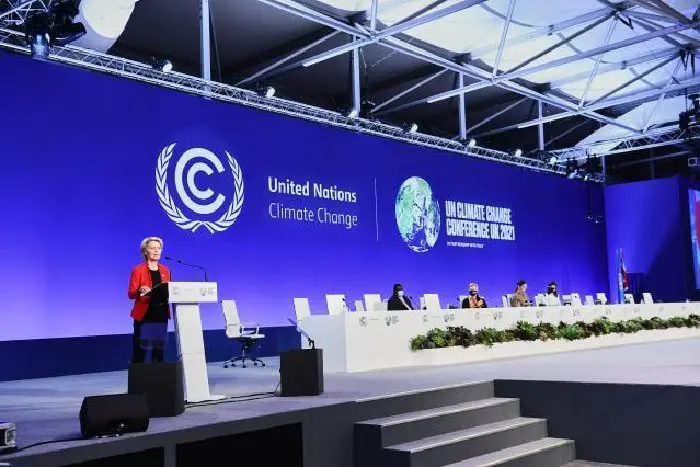COP26 resulted in the completion of the Paris Agreement rulebook and kept the Paris targets alive, giving us a chance of limiting global warming to 1.5 degrees Celsius.
At the end of the COP26 UN Climate Conference today, the European Commission supported the consensus reached by over 190 countries after two weeks of intense negotiations. COP26 resulted in the completion of the Paris Agreement rulebook and kept the Paris targets alive, giving us a chance of limiting global warming to 1.5 degrees Celsius.
Commission President Ursula von der Leyen said: “We have made progress on the three objectives we set at the start of COP26: First, to get commitments to cut emissions to keep within reach the global warming limit of 1.5 degrees. Second, to reach the target of 100 billion dollars per year of climate finance to developing and vulnerable countries. And third, to get agreement on the Paris rulebook. This gives us confidence that we can provide a safe and prosperous space for humanity on this planet. But there will be no time to relax: there is still hard work ahead.”
Executive Vice-President and EU lead negotiator, Frans Timmermans, said: “It is my firm belief that the text that has been agreed reflects a balance of the interests of all Parties, and allows us to act with the urgency that is essential for our survival. It is a text that can bring hope to the hearts of our children and grandchildren. It is a text, which keeps alive the Paris Agreement target of limiting global warming to 1.5 degrees Celsius. And it is a text which acknowledges the needs of developing countries for climate finance, and sets out a process to deliver on those needs.”
Under the Paris Agreement, 195 countries set a target to keep average global temperature change below 2°C and as close as possible to 1.5°C. Before COP26, the planet was on course for a dangerous 2.7°C of global warming. Based on new announcements made during the Conference, experts estimate that we are now on a path to between 1.8°C and 2.4°C of warming. In today’s conclusions, Parties have now agreed to revisit their commitments, as necessary, by the end of 2022 to put us on track for 1.5°C of warming, maintaining the upper end of ambition under the Paris Agreement.
In order to deliver on these promises, COP26 also agreed for the first time to accelerate efforts towards the phase-down of unabated coal power and inefficient fossil fuel subsidies, and recognised the need for support towards a just transition.
COP26 also completed the technical negotiations on the so-called Paris Agreement Rulebook, which fixes the transparency and reporting requirements for all Parties to track progress against their emission reduction targets. The Rulebook also includes the Article 6 mechanisms, which set out the functioning of international carbon markets to support further global cooperation on emission reductions.
On climate finance, the agreed text commits developed countries to double the collective share of adaptation finance within the $100 billion annual target for 2021-2025, and to reach the $100 billion goal as soon as possible. Parties also commit to a process to agree on long-term climate finance beyond 2025. The COP also decided to establish a dialogue between parties, stakeholders and relevant organisations to support efforts to avert, minimise and address loss and damage associated with climate change.
New EU Commitments
On 1-2 November, President Ursula von der Leyen represented the Commission at the World Leaders Summit which opened COP26. The President pledged €1 billion in funding for the Global Forests Finance Pledge on 1 November. On 2 November, the EU announced a Just Energy Transition Partnership with South Africa and officially launched the Global Methane Pledge, a joint EU-US initiative which has mobilised over 100 countries to cut their collective methane emissions by at least 30% by 2030, compared to 2020 levels. President von der Leyen also kicked off the EU-Catalyst partnership with Bill Gates and EIB President Werner Hoyer.
From 7 to 13 November, Executive Vice-President Frans Timmermans led the EU negotiating team in Glasgow. On 9 November, Mr Timmermans announced a new pledge of €100 million in finance for the Climate Adaptation Fund, by far the biggest pledge for the Adaptation Fund made by donors at COP26. It comes on top of significant contributions already announced by Member States, and also confirms the EU’s supporting role to the informal Champions Group on Adaptation Finance.






